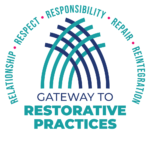A few days ago, I received a newsletter from the Crisis & Trauma Resource Institute (CTRI). I rely on several such newsletters to stay current in restorative practices related content. Commemoration of this specific day was new to me.
September 30 is Canada’s National Day for Truth and Reconciliation. You’re probably familiar with the residential schools run by the Canadian government that caused grievous harm to Indigenous people and communities. The CTRI staff took time from their daily work to reflect, to remember, to attend related events, and be part of the national movement for reconciliation.

Lest we cast a critical eye at Canada, the United States is unfortunately familiar with a legacy of harm to various people groups that desperately need significant healing and repair. CTRI provides two resources that may be of interest. The first one is 4-Workplace-Actions-to-Begin-Your-Reconciliation-Journey1 Although it refers to the specifics of Canada, the concepts can be applied to our workplace environments. The second document, Truth-and-Reconciliation-Resources,2 provides sources specific to Canada, but it also offers general information for those interested in the reconciliation process on a global scale.
On a much smaller scale, I can’t help but think of those we have personally caused harm to and who may potentially benefit from us reaching out and offering reconciliation. We may live with someone, or have family members, colleagues, neighbors, community members, and others who we’ve harmed. Reconciliation begins with each of us. Who can we extend an olive branch to today?
Sources:
- https://achievecentre.com/wp-content/uploads/2024/05/4-Workplace-Actions-to-Begin-Your-Reconciliation-Journey-proof-v4.pdf
- https://achievecentre.com/resources/truth-and-reconciliation-resources/
- Image: Dove_with_olive_branch [Eugenio Hansen, OFS, CC0, via Wikimedia Commons]

